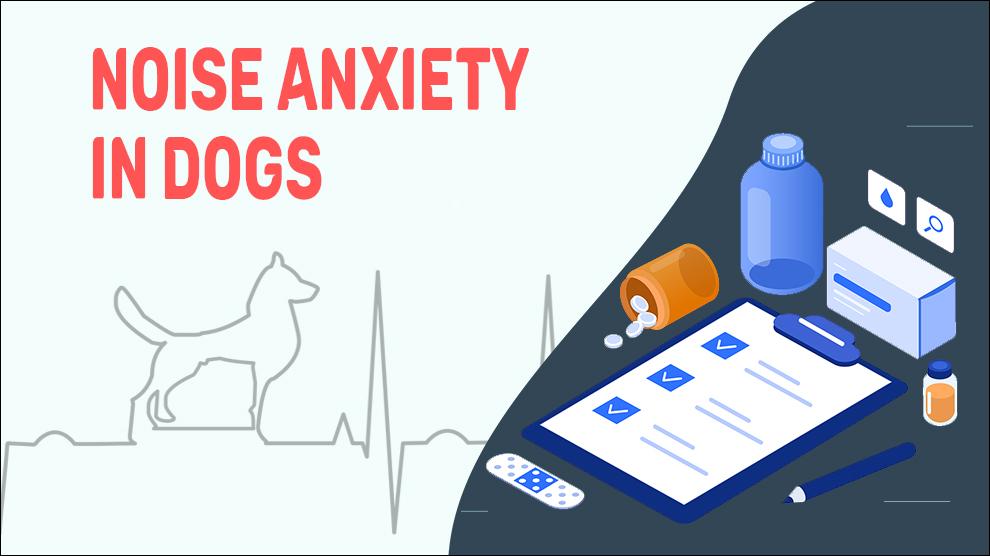What Is Noise Anxiety In Dogs?
Some of us become fearful and perturbed when we hear certain sounds, such as fireworks, thunder, traffic, or sirens. Do you know about noise-related anxiety is also common in dogs? Dogs that are affected by noise phobia are anxious about other things such as abandonment, traveling, loud noises, fear of being home alone, and fear of new people and/or children and/or other pets.
Dogs that have Separation anxiety, obsessive-compulsive disorders, and phobias are the most affected by noise anxiety– especially in breeds that are deliberately bred pack mentality dogs and working dogs. Dogs that have gone through trauma (rescue dogs) and deserted dogs in the past are more prone to experience increased noise anxiety.
Altogether, 1 out of 3 dogs exhibits noise aversion. Solitary disturbing experiences can develop into anxiety-related disorders due to repeated exposure. Scary stimuli can cause reactions that range from mild panic to intense phobic reactions. Mild panic responses may include pacing, attempts to hide, and panting, while phobic responses may include extreme agitation, fright, destructive behavior, and/or attempts to run off.
Noise sensitivity is found to be prevalent across all breeds. The most common sub traits of noise sensitivity are fear of thunder and fireworks. As the dog gets old, more responsive it will be to noise.
Symptoms Of Noise Anxiety In Dogs
- Pacing/panting/shaking/general restlessness
- Drooling, licking excessively or pawing
- Vocalizations, like whining/ howling/ barking
- Aggressive behavior (dig holes, tearing up carpets, Chewing things up etc.)
- Distraction (attempt to hide in their hideout or crates)
- Housebroken dogs may have more indoor "accidents"
Treatment Options For Noise Anxiety In Dogs
The added caveat in diagnosing noise anxiety in a dog is the detection of the cause whether it is environmental, medical, or behavioral.
The first thing in the treatment is to avoid the triggers.
Detect the sources that trigger noise anxiety in your dog. When you find out any triggers that you can manage or simply avoid, like a switching off loud television or garden motor, start with that step.
Anxiety medications
Moderate to severe situational anxiety - Alprazolam (Niravam, Alprazolam, Intensol, Xanax)
Generalized anxiety – Buspirone (BuSpar)
Situational anxiety and Separation anxiety - Clomipramine (Anafranil, Clomicalm)
Situational anxiety - Diazepam (Diastat, E Pam Tab, Valium, Vivol)
Noise phobias and aversions - Dexmedetomidine (Precedex, Sileo)
Separation anxiety - Fluoxetine (Sarafem, Prozac, Reconcile)
Home Remedies For Noise Anxiety In Dogs
- No treatment is necessary until the dog is stable.
- Create a comfortable space for your pet such as a safe area away from crowded places like the living room. Fill the dog hideout with plenty of food, treats, water, and reassuring items like toys.
Always monitor for any irregularities and check with your vet as soon as possible.
How To Prevent Noise Anxiety In Dogs?
There is no way to prevent noise anxiety or any other behavioral disorder.
Indoctrinating a healthy practice and staying away from the triggers from the start is a good way of prevention.
Affected Dog Breeds Of Noise Anxiety
Small Dog Breeds, Border Collie, Bearded Collie, Golden Retriever, German Shepherd
Causes And Types For Noise Anxiety In Dogs
1. Causes:
- Thunderstorms
- Fireworks
- Ambulance sirens
- Police/fire truck sounds
- Fly or mosquito buzzing
- Factory siren
- Other loud or unexpected noises
2. Types:
Noise anxiety due to Separation anxiety: This can occur when your dog is being abandoned/ left alone or due to a Major life change or Loss of an attachment figure or playmate etc.
Generalized noise anxiety: Exaggerated feeling of anxiety or dread that often appears “out of the blue” due to unheard sounds such as flies buzzing nearby.
Environmental anxiety: Unexpected loud noises such as sirens, fireworks, thunder, or alarms.
Social anxiety: When the dog is not socialized properly, the dog will be nervous about new sounds when around new people or around other pets.
3. Mortality:
Noise Anxiety is not typically associated with mortality; however, it can lead to other behavior issues, which consecutively have an impact on their health as well as their quality of life.
4. Diagnosis:
Noise aversion has no separate lab tests available for dogs. Noise anxiety diagnosis is usually based lot on pet parents’ depiction of the symptoms of their dog.
5. Prognosis:
The prognosis depends on detection and appropriate behavioral modification as well as environmental modification.
When To See A Vet For Noise Anxiety In Dogs?
Contact your vet right away, if you notice any of the following:
- Pacing/panting/ shaking/general restlessness
- Drooling, licking excessively, or pawing
- Vocalizations, like whining/ howling/ barking
Food Suggestions For Noise Anxiety In Dogs
- Consider a diet with Whole, organic foods and also provide sufficient antioxidants
- High protein, Low fat foods - Pork loin, turkey, flesh fish, salmon, canned tuna, shrimp, split Peas, Lentils, and Beans
- Green Leafy Vegetables: Beet greens, cabbage, Spinach, Broccoli, Green Beans, cauliflower, etc
- Lean meats: Lean beef (top loin, Tenderloin, ground round, and sirloin tip); 90% (or leaner) meat (beef, turkey, chicken)
- Omega-3 fatty acids - Salmon, tuna, Mackerel, sardines, Herring, chia seeds, flaxseed, etc
Conclusion
Noise aversion cannot be prevented but we can help dogs to overcome the problem. Inculcate healthy practices and facilitate the dogs to create a positive relationship with their private space. Make sure your dog is getting enough exercise needs and enhance their surroundings with puzzle toys, novel toys, Snufflemats, and lures.

















